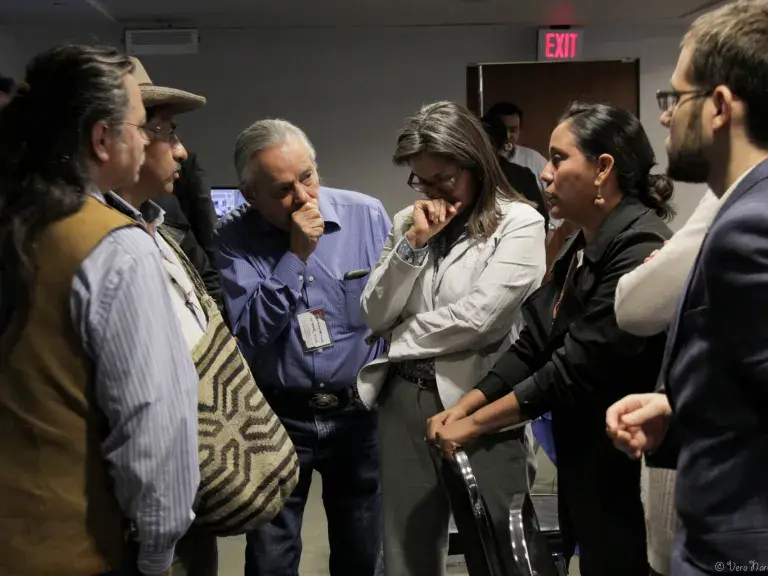
Indigenous leaders deliberate during the May 15, 2015, negotiations on the draft American Declaration on the Rights of Indigenous Peoples. Photo courtesy Vera Narvaez-Lanuza.
May 15, 2015, the Indigenous Caucus of Indigenous Peoples of the Americas withdrew from the 18th session of the negotiations on the draft American Declaration on the Rights of Indigenous Peoples. Negotiations hit a stalemate when some states in the OAS attempted to reduce rights already recognized in the UN Declaration on the Rights of Indigenous Peoples. Such repeated attempts demonstrate poor political will and are contrary to the intent of the negotiations. We support the Caucus in its decision to withdraw and we have drafted the following letter to the President of the Organization of American States Permanent Council. In addition to the poor negotiations conditions exhibited during the 18th session, we are also concerned that indigenous peoples are not adequately represented in the negotiations. We encourage indigenous leaders to review our statement and to send their own letter to the President of the Permanent Council. Please note the decision to withdraw does not include the Navajo Nation or the National Congress of American Indians.
Letter to the President of the OAS Permanent Council
May 19, 2015
H.E. Mr. Neil Parsan
President of the Permanent Council
Ambassador and Permanent Representative of Trinidad and Tobago to the OAS
1708 Massachusetts Ave., N.W.
Washington, DC 20036
Re: Draft American Declaration on the Rights of Indigenous Peoples
Your Excellency,
The Indian Law Resource Center is an indigenous non-profit law and advocacy organization, in consultative status with the UN and OAS, dedicated to the promotion and protection of the human rights of indigenous peoples. We have been actively involved in the
OAS negotiations on the draft American Declaration on the Rights of Indigenous Peoples since they began in 1989. We have consistently provided legal and technical advice to indigenous leaders and facilitated their participation in the negotiations.
The Center supports the May 15, 2015 decision of the Indigenous Caucus of Indigenous Peoples of the Americas to withdraw from the eighteenth session of negotiations on the draft American Declaration on the Rights of Indigenous Peoples. Conditions during the eighteenth session were not conducive to reaching a positive outcome and did not allow for negotiations to proceed in good faith.
Yet, the poor negotiating conditions exhibited during the eighteenth session do not preclude future efforts to achieve an acceptable draft of the American Declaration that could be adopted by the General Assembly. If there is an opportunity to continue good faith negotiations in the future, with the full, effective, and meaningful participation of indigenous peoples, their governments and representatives, we would be happy to continue working toward a positive outcome. There is just one simple condition: that the negotiated text does not fall below the standards of the UN Declaration on the Rights of Indigenous Peoples. All member states of the OAS have agreed to the UN Declaration, and they should honor their commitment. The 2014-2015 Work Plan of the Working Group to Prepare the Draft American Declaration on the Rights of Indigenous Peoples, GT/DADIN/doc.429/14 rev.1, also recognizes that “the basis and point of reference for those articles of the American Declaration on the Rights of Indigenous Peoples that have so far failed to garner consensus should be the provisions of the UN Declaration on the Rights of Indigenous Peoples."
We are also concerned that indigenous peoples are not adequately represented in the negotiations and that states still seek to limit participation to only those indigenous representatives who have been funded by the Special Fund to Prepare the Draft American Declaration on the Rights of Indigenous Peoples. Many indigenous governments represent their nations and constituents in the negotiations using their own sources of funding and can only speak on behalf of the peoples who have authorized them. We urge that participation be open to other indigenous peoples, their governments and representatives, and that they have the opportunity to speak at any future negotiations. Should future negotiations not be possible, we urge that indigenous peoples, their governments and representatives, have the opportunity to review the draft text and to submit comments to the Committee on Juridical and Political Affairs, the Permanent Council, and the General Assembly.
We are eager to see forward movement and the conclusion of negotiations after more than 26 years of work.
Sincerely,
Armstrong Wiggins
Miskito Indian from the Caribbean Coast of Nicaragua
Director, ILRC Washington Office
